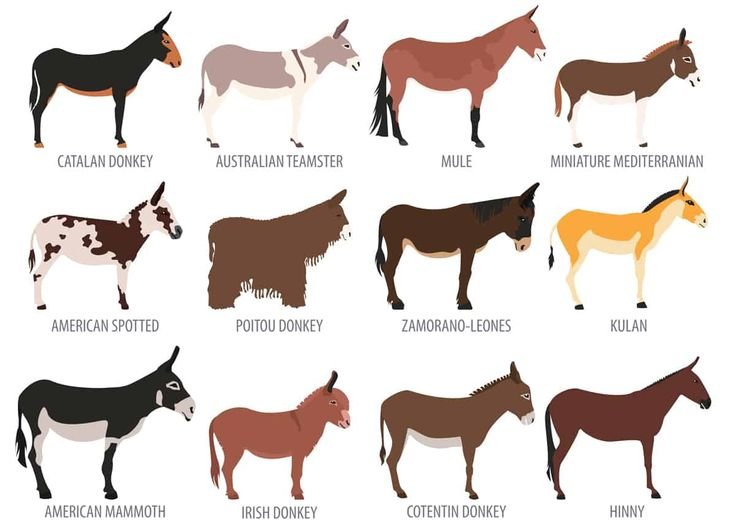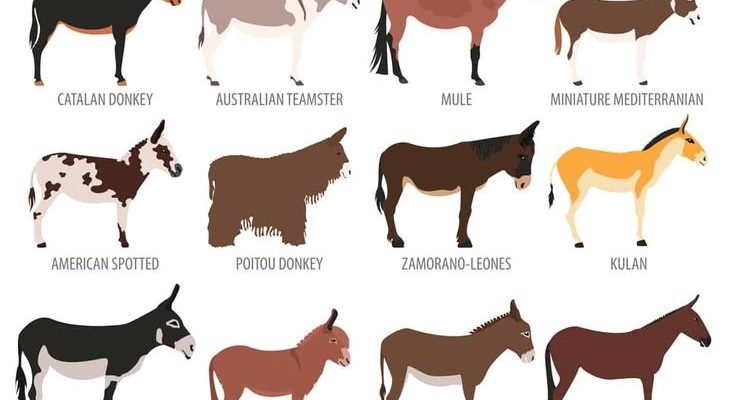
Think of donkeys as the hardworking, quieter cousins of horses—they share a lot of similarities but have distinct differences that set them apart. Let’s dive into the world of donkeys, exploring their sizes, temperaments, and various uses. You might be surprised by how diverse these gentle animals truly are!
Understanding Donkey Breeds
Donkeys belong to the *Equus africanus asinus* species, sharing lineage with horses but showcasing unique characteristics. The domestication of donkeys goes back thousands of years, with evidence suggesting they were first tamed around 4,000 years ago in North Africa.
Donkeys are categorized into several breeds, each developed for specific tasks or environments. These breeds vary significantly in size, from the tiny Miniature Mediterranean donkey to the larger Mammoth donkey. What’s truly interesting is how their size often plays a role in their temperament and utility.
You might be wondering why breeds matter. Well, understanding the traits of different donkey breeds can help you choose the right companion or working animal, depending on your needs. Whether you’re looking for a pet, a guardian for livestock, or a helping hand in the fields, there’s likely a donkey breed that fits the bill perfectly.
Miniature Donkeys: The Tiny Companions
Let’s start with one of the most popular choices for families and hobby farms—the Miniature donkey. These charming little creatures typically stand no taller than 36 inches and have a gentle, friendly nature. Their small size makes them particularly appealing as pets.
Miniature donkeys are known for their playful and affectionate temperament. They thrive on companionship and love interacting with people. Honestly, they can be quite comical, often showing off their personalities with playful antics. Imagine a tiny donkey following you around, nuzzling into your pocket for treats—that’s the kind of joy these little guys bring.
The primary use of Miniature donkeys is companionship. They make fantastic pets, especially for families with children. Their gentle demeanor means they’re usually great around kids. However, some people also train them as therapy animals due to their calm nature and ability to bond with humans.
Typical Care for Miniature Donkeys
Caring for a Miniature donkey doesn’t have to be complicated. Here are some key points to consider:
- Diet: They require a balanced diet mostly made up of hay and grass.
- Social Needs: Miniature donkeys thrive in pairs or groups, so consider getting more than one!
- Health Checks: Routine veterinary care will keep them healthy and happy.
- Safe Space: Ensure they have a spacious and safe environment to roam and play.
Every donkey, regardless of size, needs love and attention, and Miniature donkeys are no exception!
Standard Donkeys: The Versatile Worker
Moving up in size, we have the Standard donkey, which usually stands between 36 to 48 inches tall. These donkeys are often seen working on farms, helping with tasks like carrying loads or even plowing fields. Their size and strength make them great for various agricultural jobs.
Standard donkeys possess a fantastic temperament—generally calm and sure-footed, they’re known for their intelligence. They can be a bit stubborn at times, but that’s part of their charm! It’s important to establish trust and a good relationship for effective training.
In terms of use, Standard donkeys shine as working animals. They can be employed in a variety of settings, from farms to ranches, where they are used for hauling materials or serving as guardians for other livestock. Their protective instincts make them excellent companions for sheep or goats, keeping predators at bay.
Training and Handling Standard Donkeys
Training a Standard donkey requires patience and understanding. Here are some things to keep in mind:
- Start Young: Early socialization helps in training and builds trust.
- Positive Reinforcement: Use treats and praise to encourage good behavior.
- Consistency is Key: Regular practice will solidify their training.
- Respect Their Space: Ensure they have enough space to feel comfortable and secure.
Building a bond with your Standard donkey can lead to a productive and enjoyable partnership.
Mammoth Donkeys: Gentle Giants
Next, let’s talk about the Mammoth donkey, the king of the donkey world, towering at over 48 inches! These massive creatures might look intimidating, but they’re actually known for their gentle and friendly nature.
Originally bred for farm work, Mammoth donkeys were used for pulling heavy loads and assisting in agricultural tasks. Their strength is undeniable, but their calm demeanor makes them surprisingly easygoing companions.
Mammoth donkeys are perfect for those needing a reliable work animal. They can handle heavy burdens and have a natural ability to protect other livestock, making them an asset on larger farms or ranches. With their size, they can also serve as great mounts for young riders, providing a sturdy yet gentle ride.
Caring for Mammoth Donkeys
Taking care of a Mammoth donkey can be rewarding, but it does require special attention. Here are some care tips:
- Space Requirements: Ensure they have ample room to move around comfortably.
- Regular Exercise: Keeping them active is crucial for their physical and mental health.
- Diet Needs: A well-balanced diet, focusing on hay and grains, is essential.
- Health Monitoring: Routine vet check-ups are a must for maintaining their health.
With proper care, Mammoth donkeys can thrive and offer years of companionship and assistance.
Different Temperaments and Their Impacts
One of the most fascinating aspects of different donkey breeds is their temperament. As we’ve seen, Miniature donkeys tend to be more playful, while Standard and Mammoth donkeys are usually more laid-back yet surprisingly sturdy.
So why does temperament matter? Understanding a donkey’s temperament helps you pick the right breed for your situation. For instance, if you’re looking for a playful pet for your kids, a Miniature donkey might be the best choice. If you need a strong working animal, consider a Standard or Mammoth donkey.
Here’s the thing: donkeys, like any animal, thrive when they feel secure and loved. So, regardless of breed, forming a strong bond through care and attention will help bring out the best in your donkey.
How to Determine Which Temperament Fits Your Needs
When selecting a donkey, think about your lifestyle and what you hope to achieve. Here’s how you can match temperament with your needs:
- Work Animals: For farm tasks, a Standard or Mammoth donkey is ideal due to their hardiness and strength.
- Companionship: Miniature donkeys are great for families looking for playful and affectionate pets.
- Therapy or Assistance Roles: Consider the calm and gentle nature of Standard donkeys for such roles.
- Space and Environment: Assess if you have enough room and resources for the size of the donkey you choose.
Understanding different donkey breeds and their temperaments can help ensure you make the best choice.
Uses of Donkeys Across Different Breeds
Donkeys are incredibly versatile animals, with their uses varying widely across different breeds. Let’s break down how each breed shines in its own right.
Miniature donkeys are primarily used for companionship and often serve as delightful pets. Their size makes them easy to care for, and they can fit into a variety of living situations.
Standard donkeys, on the other hand, excel as working animals on farms. Whether it’s carrying tools, helping with plowing, or serving as guardians for flocks, they play a vital role in agricultural life.
Mammoth donkeys, thanks to their impressive size and strength, are perfect for heavy-duty work. They can assist in carrying loads that would be too much for smaller animals and can also become reliable mounts for younger riders.
Exploring Different Uses for Donkeys
Here’s a closer look at how these breeds can be beneficial:
- Miniature Donkeys: Ideal for families, therapy animals, and 4-H projects.
- Standard Donkeys: Helpful in farm work, pulling carts, and livestock protection.
- Mammoth Donkeys: Suited for heavy hauling, teaching young riders, and serving as impressive mounts.
- All Breeds: Great for companionship and providing emotional support.
Donkeys not only bring joy but also offer practical benefits, making them valuable additions to homes and farms.
Taking a closer look at donkey breeds reveals a fascinating world of diversity. Each breed, from the tiny Miniature donkey to the mighty Mammoth donkey, brings its own unique blend of size, temperament, and usefulness. Whether you’re considering getting a donkey as a pet, a working companion, or even as a protector for livestock, there’s a perfect breed out there for you.
Understanding these differences can help you make an informed decision. So if you’re thinking about welcoming a donkey into your life, take your time to learn about each breed’s characteristics. Eventually, you’ll find the right match that not only fits your needs but also brings joy and companionship for years to come!

